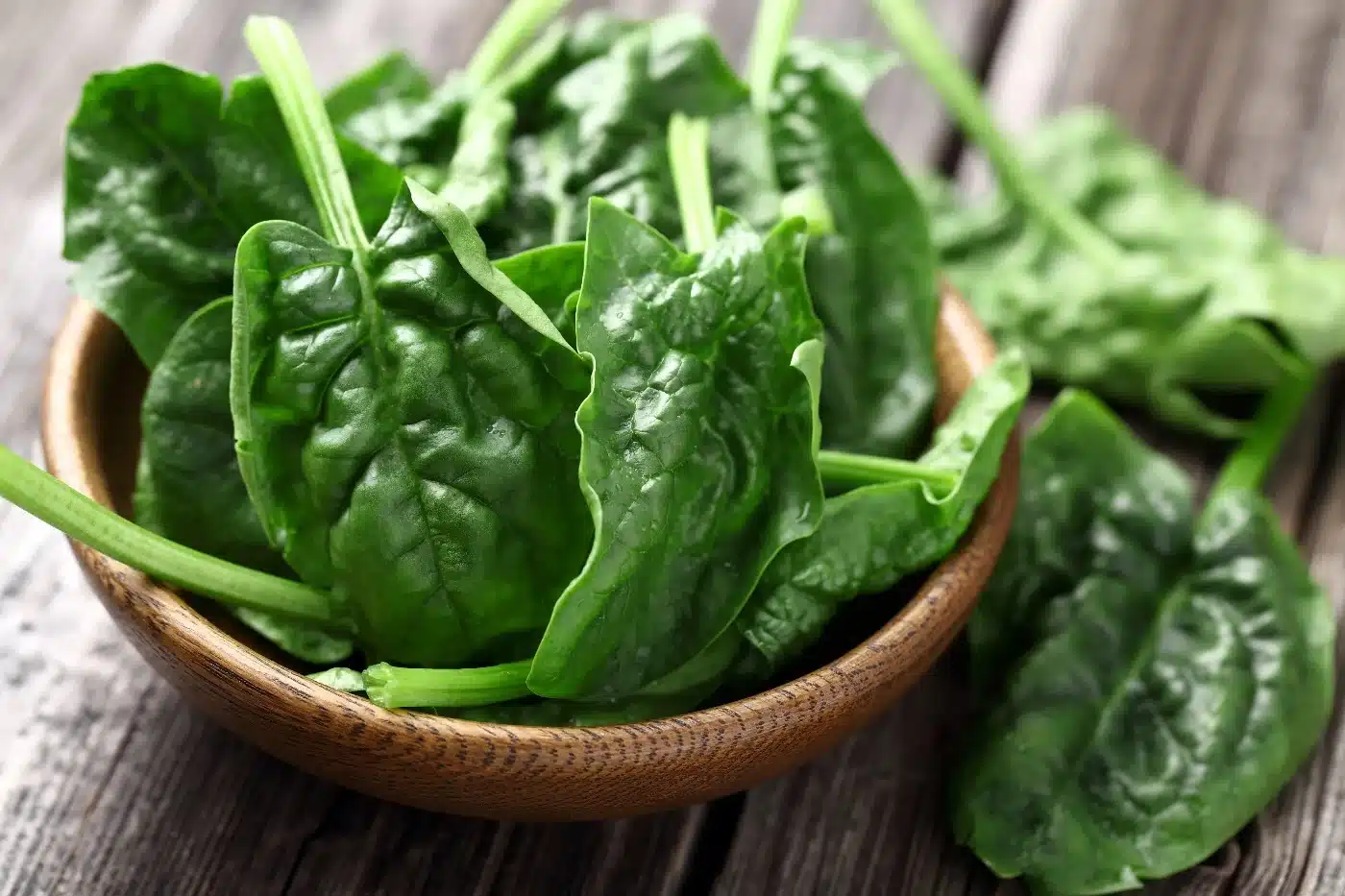Spinach (Spinacia oleracea) is a leafy green vegetable that originated in Persia and belongs to the amaranth family, along with beets and quinoa.
This versatile and nutritious vegetable can be eaten raw or cooked, and it’s a delicious addition to many dishes.
Spinach is known for its impressive nutrient profile and numerous health benefits.
Key Takeaways
- Spinach is low in calories but high in vitamins, minerals, and antioxidants
- The leafy green may help improve eye health, reduce oxidative stress, prevent cancer, and lower blood pressure
- Spinach is versatile and can be enjoyed raw or cooked in various dishes
- People prone to kidney stones or taking blood thinners should consume spinach with caution
Nutrition Facts
The nutrition facts for 3.5 ounces (100 grams) of raw spinach are:
- Calories: 23
- Water: 91%
- Protein: 2.9 grams
- Carbs: 3.6 grams
- Sugar: 0.4 grams
- Fiber: 2.2 grams
- Fat: 0.4 grams
Carbs and Fiber
Most of the carbs in spinach consist of insoluble fiber, which aids digestion by adding bulk to stool and preventing constipation. Spinach also contains small amounts of sugar, primarily glucose and fructose.
Vitamins and Minerals
Spinach is an excellent source of various vitamins and minerals, including:
- Vitamin A (from carotenoids)
- Vitamin C (a powerful antioxidant)
- Vitamin K1 (essential for blood clotting)
- Folic acid (vital for pregnant women and cellular function)
- Iron (helps create haemoglobin for oxygen transport)
- Calcium (crucial for bone health and nervous system function)
Spinach also contains potassium, magnesium, and vitamins B6, B9, and E.
Plant Compounds
In addition to vitamins and minerals, spinach boasts several beneficial plant compounds, such as:
- Lutein (linked to improved eye health)
- Kaempferol (may decrease cancer and chronic disease risk)
- Nitrates (may promote heart health)
- Quercetin (may ward off infection and inflammation)
- Zeaxanthin (can improve eye health, along with lutein)
Health Benefits of Spinach
1. Reduces Oxidative Stress
Spinach contains antioxidants that combat oxidative stress caused by free radicals, which are byproducts of metabolism. Oxidative stress can accelerate ageing and increase the risk of cancer and diabetes. Studies have shown that spinach helps prevent oxidative damage.
2. Promotes Eye Health
The carotenoids zeaxanthin and lutein, found in high quantities in both spinach and human eyes, protect the eyes from damage caused by sunlight. Several studies suggest that these compounds may help prevent macular degeneration and cataracts, two major causes of blindness.
3. May Help Prevent Cancer
Spinach contains MGDG and SQDG, two components that may slow down cancer growth. Human studies link spinach consumption to a reduced risk of prostate and breast cancer, while animal studies suggest it may suppress cancer formation. The high antioxidant content in spinach may also contribute to its cancer-fighting properties.
4. Regulates Blood Pressure
The high nitrate content in spinach has been shown to moderate blood pressure levels and decrease the risk of heart disease. Several studies have found that eating spinach effectively lowers blood pressure, promoting heart health.
Potential Downsides
While spinach is generally considered very healthy, it may cause adverse effects in some individuals:
- Kidney Stones: Spinach is high in calcium and oxalates, which can contribute to the formation of calcium oxalate kidney stones. People at high risk of developing kidney stones should limit their intake.
- Blood Clotting: The high vitamin K1 content in spinach could interfere with blood-thinning medications like warfarin. People taking these medications should consult their healthcare provider before consuming large amounts of spinach.
FAQ
- Is it better to eat spinach raw or cooked?
Both raw and cooked spinach offer health benefits. Cooking spinach may reduce its vitamin C content but increases the availability of certain nutrients, such as iron and vitamin A. - How much spinach should I eat daily?
While there is no specific recommended daily intake for spinach, aim to include a variety of leafy greens in your diet. A good starting point is to consume 1-2 cups of leafy greens, such as spinach, per day. - Can I eat spinach if I’m taking blood thinners?
If you’re taking blood thinners like warfarin, consult your healthcare provider before consuming large amounts of spinach, as its high vitamin K1 content may interfere with the medication’s effectiveness. - Is spinach safe for everyone to eat?
Spinach is generally safe for most people to consume. However, those prone to kidney stones may need to limit their intake due to the vegetable’s high calcium and oxalate content. - What are some easy ways to incorporate spinach into my diet?
Spinach is a versatile vegetable that can be enjoyed in many ways. Add raw spinach to salads and sandwiches, blend it into smoothies, or sauté it as a side dish. You can also incorporate spinach into pasta dishes, soups, and stir-fries.
